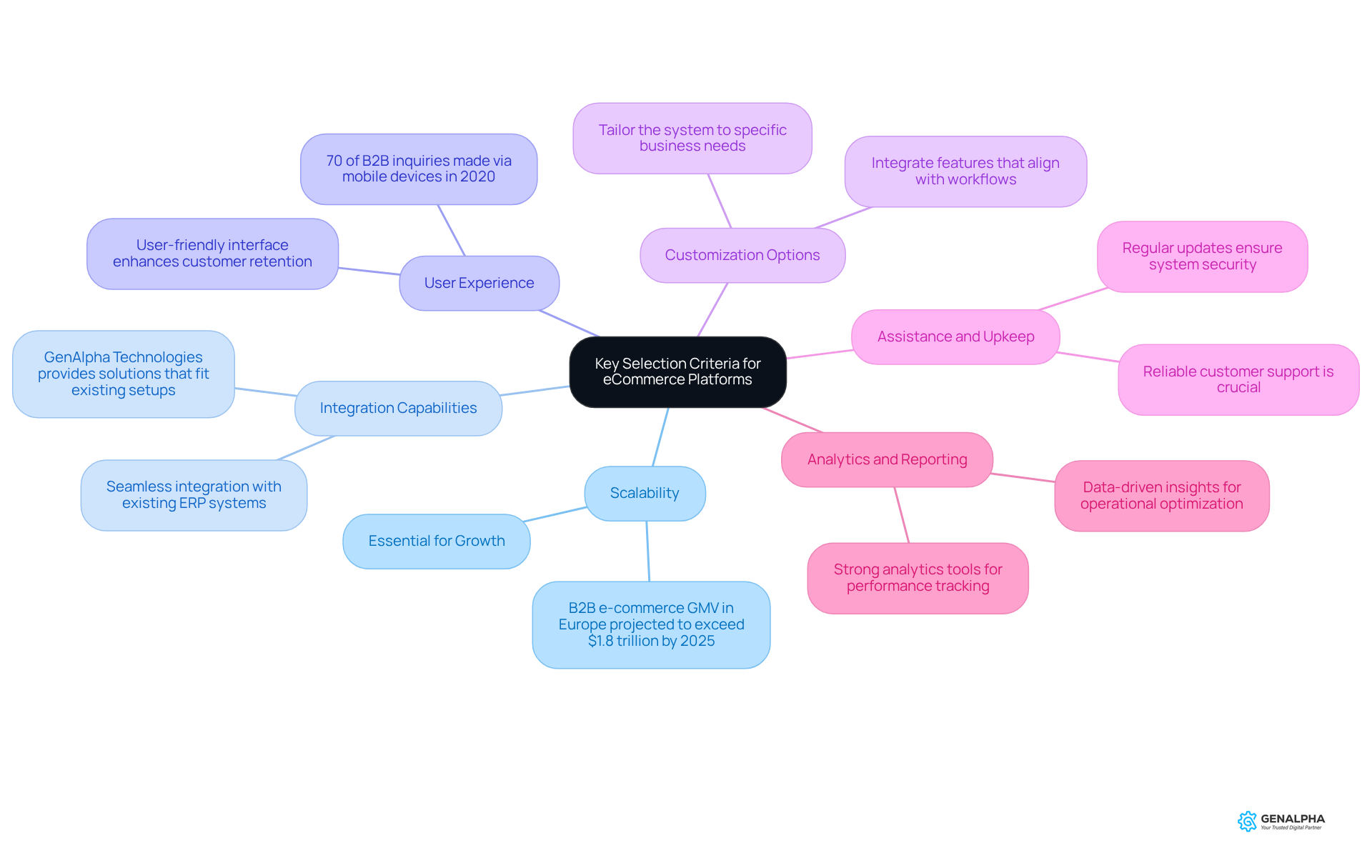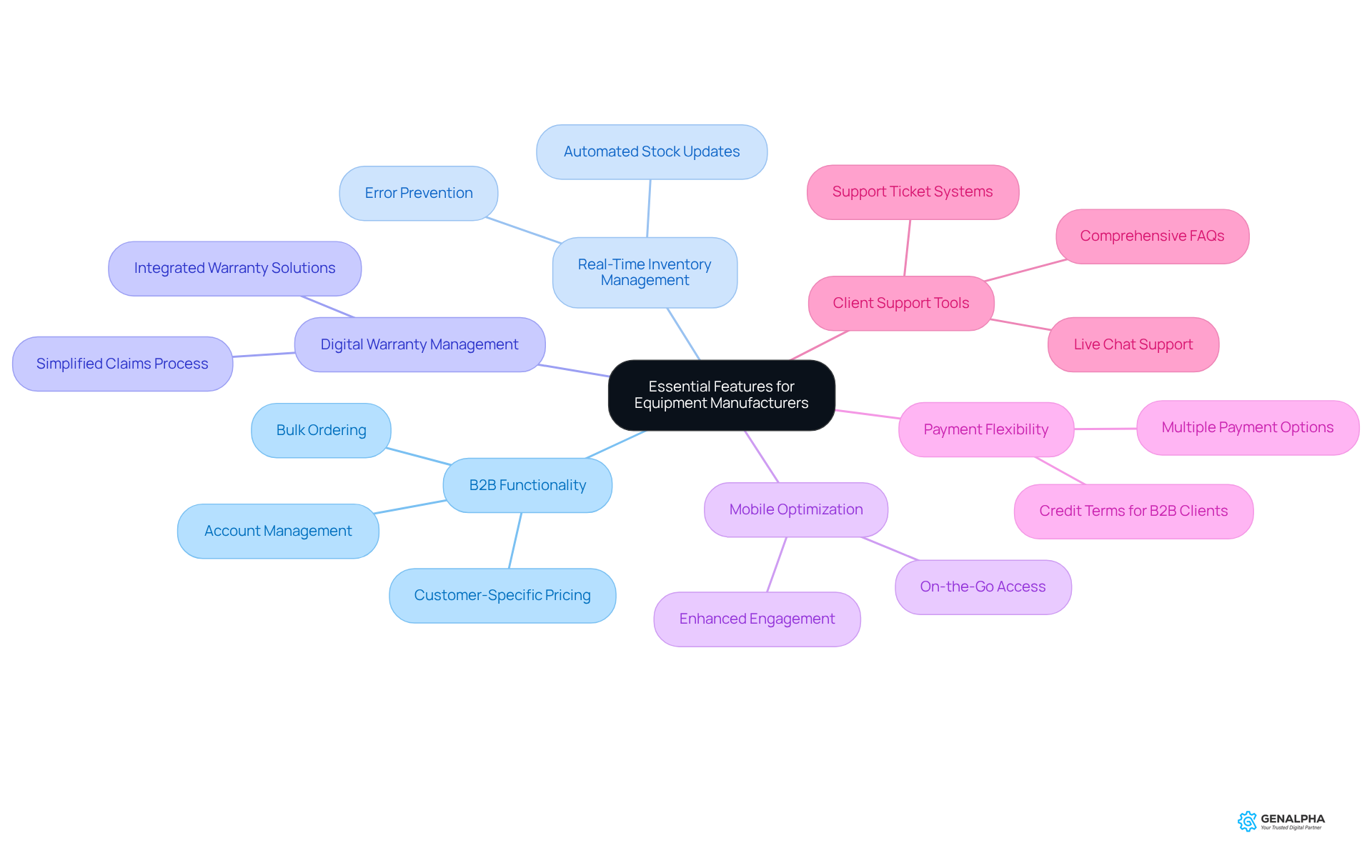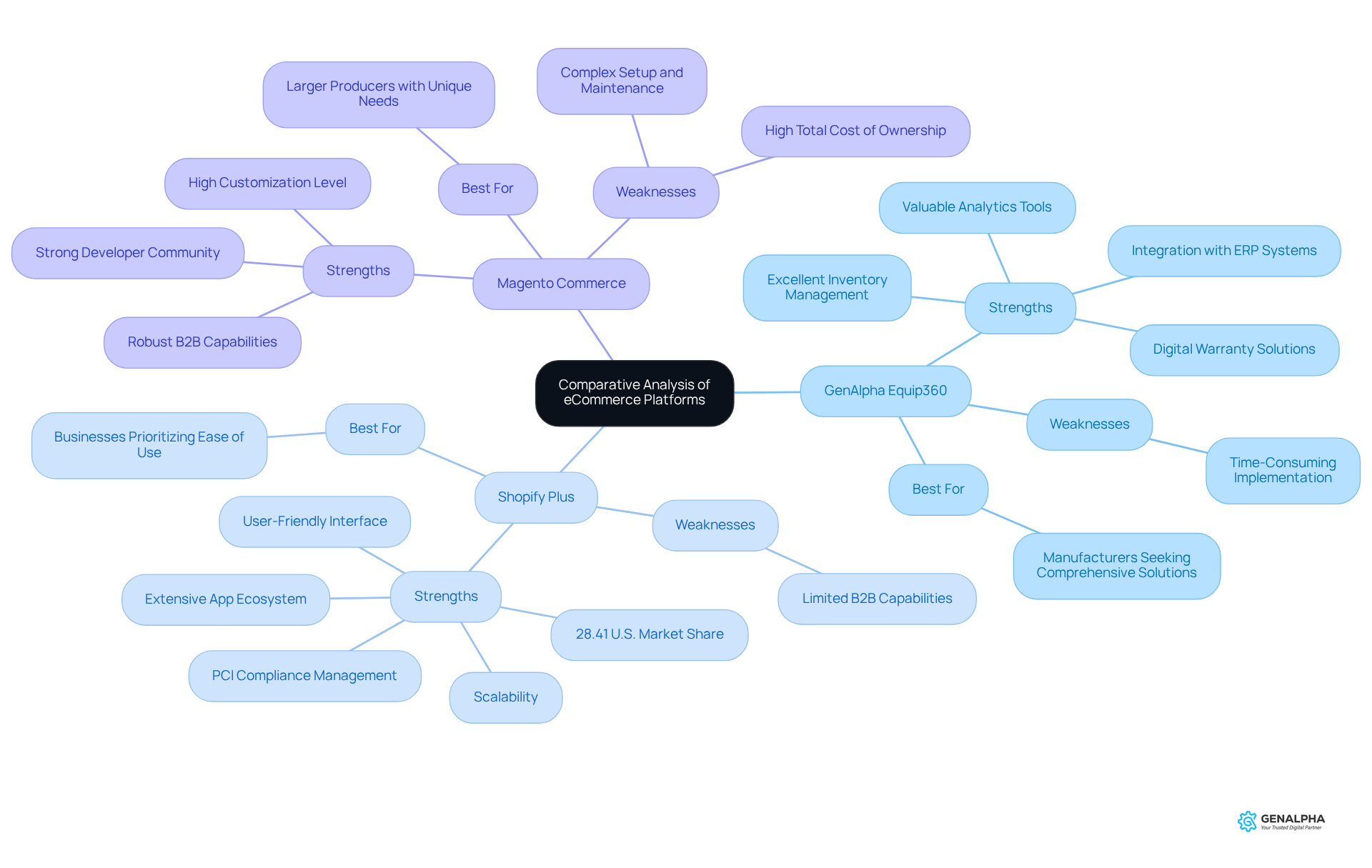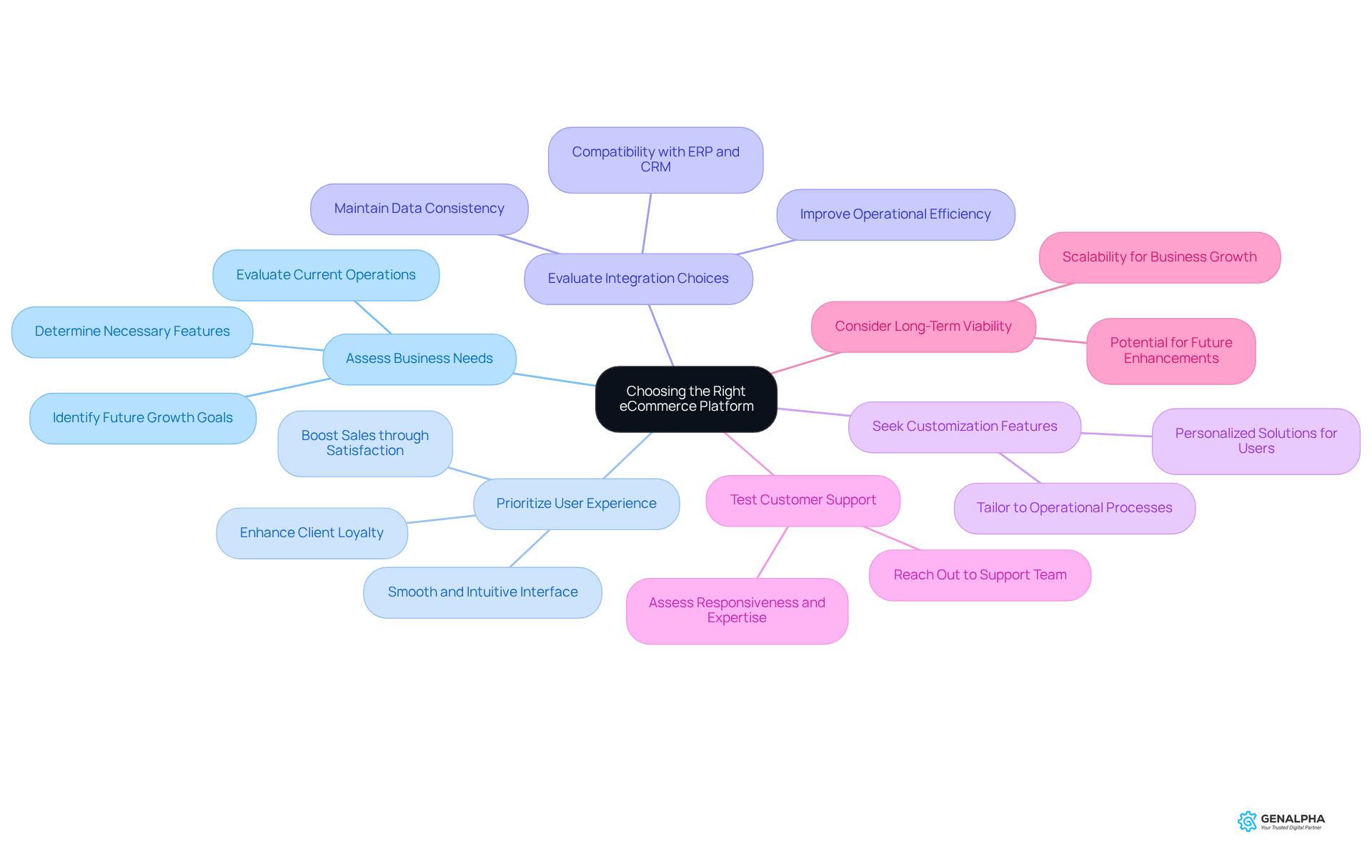Overview
This article dives into the quest for the best eCommerce platform tailored for equipment manufacturers. Have you ever wondered what features really matter? Well, we’re here to highlight the essentials and compare some leading options. Scalability, integration capabilities, and user experience are just the tip of the iceberg. We’ll also explore functionalities like B2B support and real-time inventory management, which are super important for meeting the unique needs of equipment manufacturers and keeping operations running smoothly.
So, why should you care? Because understanding these features can make all the difference in your business. Imagine having a platform that grows with you, integrates seamlessly with your existing systems, and offers a user-friendly experience. Sounds great, right?
As we walk through this analysis, think about what your business truly needs. Are you looking for something that supports your B2B transactions? Or perhaps real-time inventory tracking is a game-changer for you? By the end of this article, you’ll have actionable insights to help you make the right choice for your equipment manufacturing needs.
Introduction
Navigating the world of eCommerce platforms can feel overwhelming for equipment manufacturers, especially with B2B e-commerce expected to soar past $1.8 trillion by 2025. Choosing the right platform is essential—it can make a big difference in scalability, integration, and user experience.
But with so many options out there, how can manufacturers ensure they pick a system that not only meets their current needs but also supports future growth and efficiency?
In this article, we’ll explore the must-have features and key criteria for selection that can help manufacturers make a smart choice, while also comparing leading platforms tailored to their specific requirements.
Key Selection Criteria for eCommerce Platforms
When you're on the hunt for the right eCommerce platform, there are a few key things you really should keep in mind:
- Scalability: Think about how the system will grow with you. It’s important that it can adapt as your business expands, letting you add new products and clients without needing a complete overhaul. With B2B e-commerce gross merchandise value in Europe expected to surpass $1.8 trillion by 2025, scalability isn’t just a nice-to-have; it’s essential for your long-term success.
- Integration Capabilities: You want a platform that plays nicely with your existing ERP systems. This seamless integration is crucial for keeping everything running smoothly and ensuring your data stays consistent. Companies like GenAlpha Technologies shine in this area, providing solutions that fit right in with your current setup, making the transition to enhanced digital capabilities a breeze.
- User Experience: A user-friendly interface is key to keeping your clients happy and encouraging them to come back for more. Did you know that 70% of B2B inquiries were made via mobile devices in 2020? That means your system needs to be mobile-responsive to meet client expectations.
- Customization Options: Every business is unique, and your eCommerce platform should reflect that. The ability to tailor the system to your specific needs is vital for tackling any operational challenges you face. Customization allows you to integrate features that align with your workflows and the needs of your clients.
- Assistance and Upkeep: Reliable customer support and regular updates are a must-have to keep your system running smoothly and securely over time. Technical support is crucial for helping users navigate any issues that pop up during operations.
- Analytics and Reporting: Strong analytics tools are essential for tracking your performance metrics and making informed decisions. These insights enable you to fine-tune your operations and boost customer engagement effectively.
By focusing on these criteria, you can identify the best ecommerce platform that not only meets your current needs but also supports your future growth and operational efficiency. What features are you most excited about in your search for the perfect eCommerce platform?

Essential Features for Equipment Manufacturers
When it comes to eCommerce platforms, equipment manufacturers really should keep an eye on some essential features that can make a big difference:
- B2B Functionality: Think about it—bulk ordering, customer-specific pricing, and solid account management are crucial for making B2B transactions run smoothly. As Mandie Sellars points out, it’s important for B2B businesses to take the time to fully grasp their eCommerce needs to select the best ecommerce platform that aligns with their business goals.
- Real-Time Inventory Management: Ever faced the headache of overselling? Implementing real-time inventory tracking and automated stock updates can help prevent that and ensure orders are fulfilled efficiently. It’s a common challenge in the manufacturing world, and with 33% of all B2B orders in 2025 containing an error, effective inventory management is more important than ever.
- Digital Warranty Management: Imagine how much easier life would be with integrated warranty solutions! They not only boost customer satisfaction but also simplify claims and service processes. In fact, over one-third of manufacturers say that the best ecommerce platform has enhanced client experience, demonstrating just how beneficial these solutions can be.
- Mobile Optimization: In today’s fast-paced world, having a mobile-friendly platform is a must. It allows users to access services on-the-go, greatly enhancing engagement and convenience. With a significant portion of coming from mobile devices, this feature is non-negotiable.
- Payment Flexibility: Offering various payment options, like credit terms for B2B clients, makes transactions smoother and meets the diverse financial needs of business partners. Who doesn’t appreciate a little flexibility?
- Client Support Tools: Features such as live chat, comprehensive FAQs, and support ticket systems are essential for enhancing service. They enable quick issue resolution and help build positive client relationships. As Steve Duran highlights, the best ecommerce platform enables streamlined processes that can really elevate customer interactions.
These features are specifically tailored to meet the unique needs of equipment producers, ensuring they can deliver a seamless and efficient purchasing experience. So, are you ready to enhance your eCommerce strategy?

Comparative Analysis of Leading eCommerce Platforms
In this comparative analysis, let’s dive into three leading eCommerce platforms that are tailored specifically for equipment manufacturers:
-
- Strengths: This platform is like a dream come true for manufacturers! Equip360 is designed with you in mind, excelling in inventory management and integrating digital warranty solutions. This means happier customers and . Plus, it plays nicely with your existing ERP systems, making transitions a breeze. GenAlpha's analytics tools also provide valuable insights into your operational performance, which can really help guide your strategic decisions.
- Weaknesses: Just a heads-up, the implementation process might take some time, which could mean waiting a bit for those immediate benefits.
- Best For: If you’re a manufacturer looking for a comprehensive solution that aligns perfectly with your operational needs and boosts your online sales, this is the one for you!
-
Shopify Plus:
- Strengths: Shopify Plus is all about user-friendliness. It boasts an extensive app ecosystem and robust customer support, making it an attractive choice for businesses that prioritize ease of use. Its scalability means you can grow without the hassle of changing systems, and it efficiently manages PCI compliance to ensure secure transactions. Did you know Shopify holds a whopping 28.41% of the U.S. eCommerce market? That’s a testament to its reliability and popularity!
- Weaknesses: However, while it’s great for B2C operations, Shopify Plus does have limited B2B capabilities compared to more specialized systems. This might be a challenge for producers with complex sales processes.
- Best For: If you value quick deployment and a straightforward user experience, especially if your B2B needs aren't too complicated, Shopify Plus could be your best bet.
-
Magento Commerce:
- Strengths: Magento Commerce really shines with its high level of customization and robust B2B capabilities, all backed by a strong developer community. If you need tailored solutions to meet specific operational demands, this platform is ideal. Its flexibility allows for extensive alterations, making it perfect for larger producers with unique needs.
- Weaknesses: On the flip side, Magento can be a bit complex. It requires technical expertise for setup and ongoing maintenance, which might pose a barrier for smaller producers without dedicated IT resources. Plus, keep in mind that the total cost of ownership can be high due to ongoing development and customization needs.
- Best For: Larger producers who have specific customization requirements and the technical resources to manage a more intricate system will find Magento Commerce to be a great fit.
This analysis highlights the distinct features of each system, helping producers find the best ecommerce platform that aligns with their operational needs and growth aspirations. Remember to consider any hidden costs associated with each system, along with the importance of security features, especially when handling sensitive client information. What are your thoughts on these platforms?

Recommendations for Choosing the Right eCommerce Platform
When you're on the hunt for the perfect eCommerce platform, there are some key recommendations to keep in mind:
- Assess Business Needs: Start by taking a good look at your current operations and future growth goals. What features do you really need to align with your business objectives?
- Prioritize User Experience: It's crucial that the system offers a smooth and intuitive experience for both your clients and your internal team. A positive user experience can make all the difference in building client loyalty and boosting sales. A solid digital sales system is essential for creating a flexible and immersive buying experience, which can really elevate client satisfaction.
- Evaluate Integration Choices: Make sure to choose a system that can easily connect with your existing ERP and CRM solutions. This will help maintain data consistency and improve .
- Seek Customization Features: Look for systems that allow you to tailor them to your specific operational processes and client needs. This flexibility can lead to personalized solutions that keep users engaged.
- Test Customer Support: Before making your final decision, reach out to the service's support team. Their responsiveness and expertise are vital for resolving issues quickly and minimizing disruptions.
- Consider Long-Term Viability: Opt for a system that not only meets your current needs but also has the potential for future enhancements and scalability. You want something that can grow alongside your business.
By following these tips, you can make informed decisions that boost your digital capabilities and significantly enhance customer satisfaction. For instance, companies like The North Face have successfully transitioned to digital merchandising solutions, resulting in a remarkable 35% drop in B2B sales and marketing expenses. This really highlights the tangible benefits of adopting the best ecommerce platform. Plus, GenAlpha's Equip360 platform is specifically designed to optimize inventory management, further aiding manufacturers in their digital transformation journey.

Conclusion
Choosing the right eCommerce platform for equipment manufacturers is a big deal—it can really shape the future of your business! The best platform should not only fit your current needs but also grow with you, helping you keep up with the ever-changing market. By focusing on important criteria like scalability, integration capabilities, user experience, and customization options, you can find a platform that fits perfectly with your unique operational needs.
Throughout this article, we’ve highlighted some essential features tailored just for equipment manufacturers. Think about:
- B2B functionality
- Real-time inventory management
- Mobile optimization
These are crucial elements that can really enhance the purchasing experience and boost customer satisfaction. Plus, we’ve compared leading platforms like GenAlpha Equip360, Shopify Plus, and Magento Commerce, giving you valuable insights into their strengths and weaknesses. This information can guide you in making informed choices.
In the end, the importance of picking the right eCommerce platform can’t be stressed enough. As the demand for efficient digital solutions keeps growing, it’s vital for manufacturers to prioritize platforms that not only meet their current needs but also offer the flexibility to grow and innovate. Embracing the right technology can lead to better operational efficiency, stronger customer relationships, and a competitive edge in the marketplace. So, take your time to explore your options and align them with your business goals; this will set you up for a successful digital transformation journey!
Frequently Asked Questions
What is scalability in the context of eCommerce platforms?
Scalability refers to the platform's ability to grow and adapt as your business expands, allowing you to add new products and clients without needing a complete overhaul.
Why are integration capabilities important for eCommerce platforms?
Integration capabilities are crucial because they ensure the platform can seamlessly connect with your existing ERP systems, maintaining consistent data and smooth operations.
How does user experience impact eCommerce platforms?
A user-friendly interface enhances client satisfaction and encourages repeat business. Additionally, with a significant percentage of B2B inquiries made via mobile devices, the platform must be mobile-responsive.
What role does customization play in choosing an eCommerce platform?
Customization allows businesses to tailor the platform to their specific needs, enabling the integration of features that align with their workflows and address operational challenges.
Why is assistance and upkeep important for an eCommerce platform?
Reliable customer support and regular updates are essential for maintaining system performance and security, as well as helping users navigate any issues that may arise.
What are the benefits of analytics and reporting in eCommerce?
Strong analytics tools are vital for tracking performance metrics, allowing businesses to make informed decisions, fine-tune operations, and enhance customer engagement.




